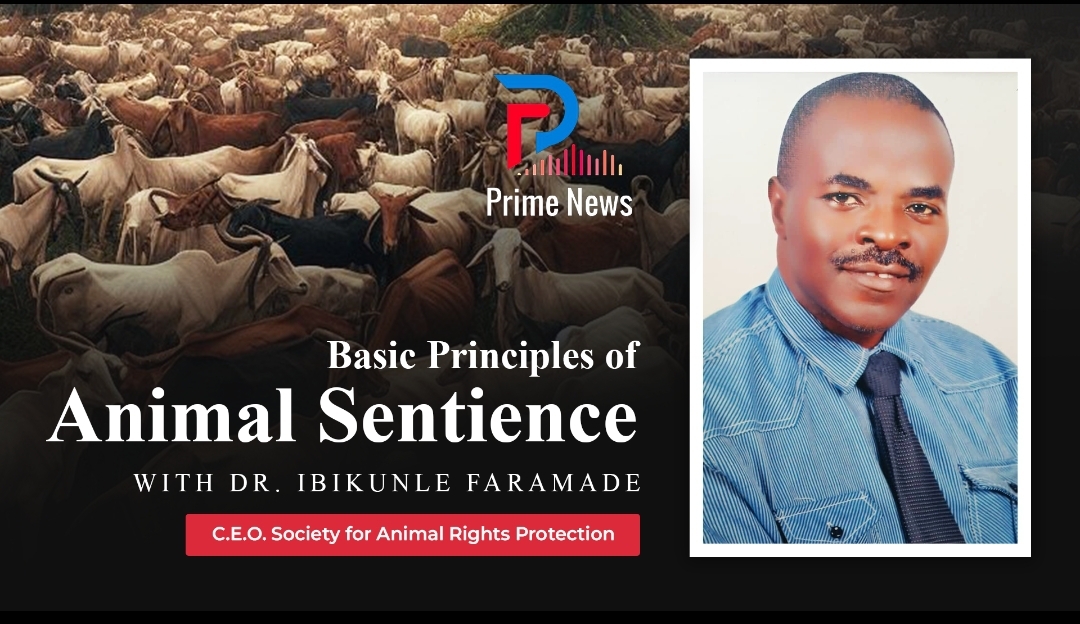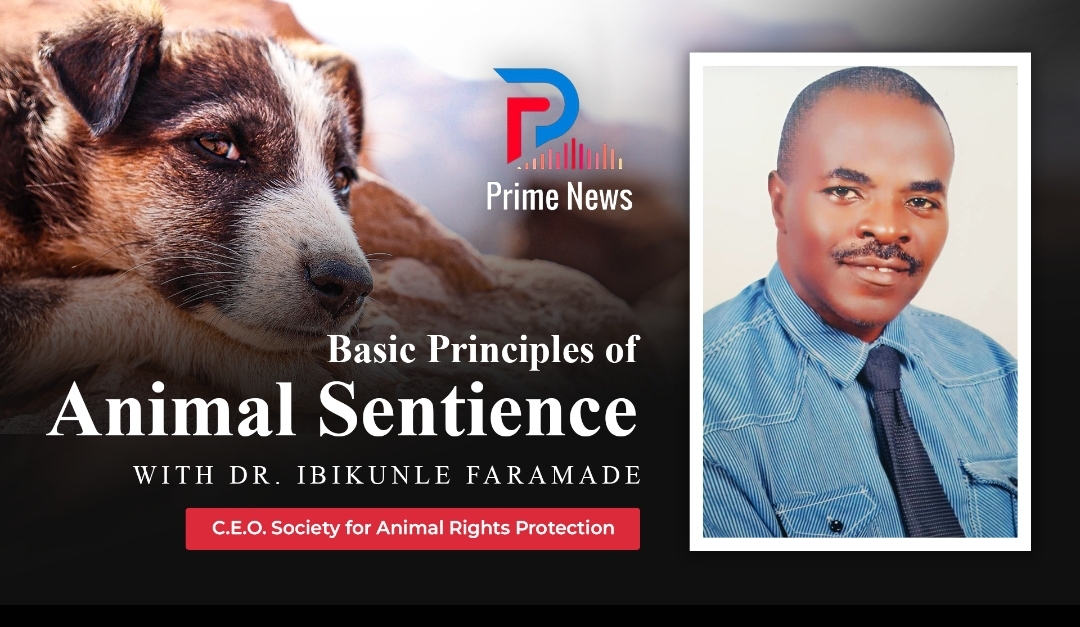By Dr Ibikunle Faramade
The success of any endeavor, no matter how noble, depends on legal frameworks which stipulate the obligation of all stakeholders and disciplinary measures that would be meted out to offenders.
Animal welfare regulation in Nigeria derives from the United Nations Declaration on Animal Rights 1978, which states as follows:
Universal declaration of animal rights was solemnly proclaimed in Paris on 15 October 1978 at the UNESCO headquarters
Preamble:
- Whereas all animals have rights;
- Whereas disregard and contempt for the rights of animals have resulted and continue to result in crimes by man against nature and against animals;
- Whereas recognition by the human species of the right to existence of other animal species is the foundation of the co-existence of species throughout the animal world;
- Whereas genocide has been perpetrated by man on animals and the threat of genocide continues;
- Whereas respect for animals is linked to the respect of man for men;
- Whereas from childhood man should be taught to observe, understand, respect and love animals;
It is Hereby Proclaimed:
Article 1
All animals are born with an equal claim on life and the same rights to existence.
Article 2
- All animals are entitled to respect.
- Man as an animal species shall not arrogate to himself the right to exterminate or inhumanely exploit other animals. It is his duty to use his knowledge for the welfare of animals.
- All animals have the right to the attention, care and protection of man.
Article 3
- No animal shall be ill-treated or shall be subject to cruel acts.
- If an animal has to be killed, this must be instantaneous and without distress.
Article 4
- All wild animals have the right to liberty in their natural environment, whether land, air or water, and should be allowed to procreate.
- Deprivation of freedom, even for educational purposes, is an infringement of this right.
Article 5
- Animals of species living traditionally in a human environment have the right to live and grow at the rhythm and under the condition of life and freedom peculiar to their species.
- Any interference by man with this rhythm or these conditions for purposes of gain is an Infringement of this right.
Article 6
- All companion animals have the right to complete their natural lifespan.
- Abandonment of an animal is a cruel and degrading act.
Article 7
- All working animals are entitled to a reasonable limitation of the duration and intensity of their work, to the necessary nourishment, and to rest. Animal experimentation involving physical or psychological suffering is incompatible with the rights of animals whether it be for scientific, medical, commercial, or any other form of research.
- Replacement methods must be used and developed.
Article 8
Where animals are used in the food industry, they shall be reared, transported, lairaged and killed without the infliction of suffering.
Article 9
- No animal shall be exploited for the amusement of man
- Exhibitions and spectacles involving animals are incompatible with their dignity.
Article 10
Any act involving the wanton killing of an animal is biocide, that is, a crime against life.
Article 11
- Any act involving mass killing of wild animals is genocide, that is, a crime against the species.
- Pollution or destruction of the natural environment leads to genocide.
Article 12
- Dead animals shall be treated with respect.
- Scenes of violence involving animals shall be banned from cinema and television,
- Except for humane education.
Article 13
- Representatives of movements that defend animal rights should have an effective voice at all levels of government.
- The rights of animals, like human rights, should enjoy the protection of law. The Universal Declaration of Animal Rights was solemnly proclaimed in Paris on 15 October 1978 at the UNESCO headquarters.
The first attempt to domesticate these United Nation’s declarations is found in the Nigerian Criminal Code (1990) which recognized the ability of animals to suffer and to experience psychological states of being infuriated and being terrified, which applies to domestic and captive animals, including birds, fish and reptiles, but not wild animals. Specifically, section 495 of the Nigerian Criminal Code (1990) prohibits acts of cruelty to animals. These include, under sub-section 1(a), cruelly beating, kicking, over-loading, infuriating or terrifying an animal, or as the owner, allowing this to happen. Sub-section 1(b) creates an offense of failure to act, prohibiting wantonly or unreasonably doing or omitting to do any act that inflicts unnecessary suffering. This section also prohibits transporting animals in a manner that causes unnecessary suffering (c), administration of poison (d), surgical operations performed without due care (e), and action associated with animal fighting (f).
In addition, the welfare of farm animals, protection of animals used for draught (particularly, prohibition of over-riding and over-loading) and recreation, protection of animals used in scientific research and animals in captivity is guaranteed in sections 450, 456 and 495 of the Code. The only flaw in this law is that there was no mention or specific reference to animals used in farming, although, food animals are excluded from the protection of section 495. The Wild Animals (captive animals) Regulations (1975) also impose the duties of welfare assurance for wild animals by license holders (i.e. owners of facilities holding wild animals captive).
Furthermore, animal fighting and baiting are banned under section 495 of the Criminal Code (1990), putting restrictions on the use of animals for recreational purposes. However, apart from the above there is no policy or legislation related specifically to animals used for entertainment.
There are several limitations of the Criminal Code as far as its enforcements are concerned. The definition and the categorization of animals as sentient beings was unclear. Wild animal welfare were not expressly captured as sentient beings, notwithstanding the provisions of section 450.
The general awareness of the Code was abysmally poor, among the people, as well as some law enforcement agents. The fines imposed on offenders became outdated over time (because of time value of money), became less punitive and could not serve as deterrents to prospective offenders. We could only refer to it as the benchmark or baseline, in the pursuit of animal welfare promotion in Nigeria.
Because of these demerits, a comprehensive Animal Disease Control Act was passed into law in 2022 and has since been accented to by the President. Sections 21, 22, 23, 24 and 25 devotes ample sub-sections to the promotion of animal welfare and prevention of animal cruelty in one form or the other, with clear punitive measures (as of now), for offenders. Ceteris paribus, this shall be the focus of this column next week Thursday, inter alia.
In the mean time we wish to commend the National Assembly for giving the Endangered Species Conservation and Protection Bill an expeditious attention, having passed the first reading yesterday in the House of Representatives. The timely passage of this law would bring Nigeria in line with international standards and agreements, especially in the global efforts to tackle illicit wildlife trade, wildlife trafficking and protection of endangered species including lions, elephants, gorillas, chimpanzees, pangolins etc. in the spirit of national alignment with the Convention on International Trade in Endangered Species of Wild Fauna and Flora (CITES).
Dr. Ibikunle Faramade is a veterinary pathologist and a lecturer at the Federal College of Animal Health & Production Technology, Apata. Ibadan. He’s the C.E.O of the Society for Animal Rights Protection, a non-profit and a non-governmental organization dedicated to the promotion of animal welfare, animal rights and prevention of cruelty to animals.
animalrightsprotection2020@gmail.com , +2348028305284



